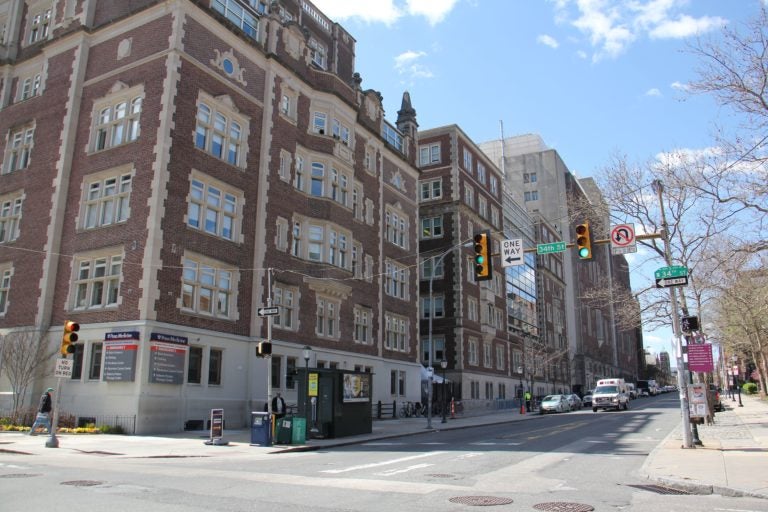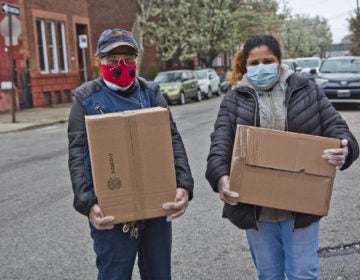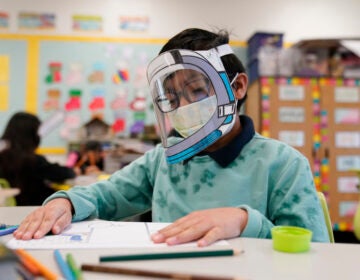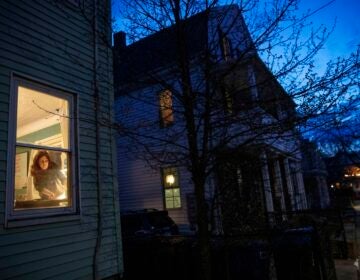Philadelphia could close a section of Spruce Street for tent hospital
The Hospital of the University of Pennsylvania may put a field hospital on a public street, the first commandeering of open land for medical use since 1918.

The Hospital of the University of Pennsylvania is reportedly considering erecting a medical hospital on Spruce Street between 34th and 36th Streets. (Emma Lee/WHYY)
Editor’s note: This article was updated on Friday, April 3, 2020.
A section of Spruce Street near the University of Pennsylvania could close to traffic, to make way for a field hospital to accommodate a potential surge in COVID-19 patients.
Hospital of the University of Pennsylvania (HUP) trauma surgeon Jeremy W. Cannon told The Philadelphia Inquirer that the hospital had spoken with federal officials about converting a stretch of Spruce Street between 34th and 36th streets into hospital tent space. Auto traffic would be diverted along the bustling stretch, which runs between the hospital and the university.
“The nice thing about Spruce Street is that it’s close to the main hospital,” Cannon told the newspaper.
The closure of the busy street for such a facility would require the approval of city officials, including City Council.
But that conversation has not yet begun and it is unclear if it will ultimately proceed.
The proposed Spruce Street location for potential medical tents was “part of internal surge planning exercises,” not a plan that “had been vetted or approved by the institution,” city spokesperson Lauren Cox said in an email Friday afternoon.
“Hospitals are exploring all options, but this is not something that is confirmed to be in motion right now,” she said, noting that the city has an open line of communication with top hospital administrators.
West Philadelphia Councilmember Jamie Gauthier said that while she had not discussed the idea with the hospital, she supports “whatever efforts are going to save lives.”
“We are in the midst of a once-in-a-generation global public health crisis — and it’s only just begun here in Philly,” Gauthier said. “We need to do everything we can to expand our health care system capacity, and if that means diverting traffic for a period of time, so be it.”
The medical facility would be built as a precautionary measure and, ideally, never used. But health officials have been on edge since a spike of coronavirus cases began to overwhelm hospitals in New York City.
Many regional healthcare centers have already erected additional tent space and Temple University’s Liacouras Center was recently converted into a field hospital.
But the Spruce Street plan would be the first time a large public space in Philadelphia was converted for patient use since the 1918 flu pandemic.
The University of Pennsylvania’s nearby campus quad was also reportedly under consideration as overflow space for patients.
Philadelphia Managing Director Brian Abernathy has said the city hopes to also eventually have 1,000 beds available to people who can’t quarantine at home, or don’t have a home. Already, the city has opened a quarantine facility at a rented Holiday Inn Express on 13th and Walnut streets.
All 13 floors of the hotel are being used as medical space with some floors reserved for people who test positive for COVID-19 and others used for symptomatic patients who are awaiting test results. The managing director said city officials are negotiating with other property owners for sites that may ultimately allow for 800 additional beds.
WHYY is your source for fact-based, in-depth journalism and information. As a nonprofit organization, we rely on financial support from readers like you. Please give today.





![CoronavirusPandemic_1024x512[1]](https://whyy.org/wp-content/uploads/2020/03/CoronavirusPandemic_1024x5121-300x150.jpg)



